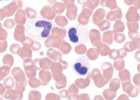Inherited disorders of Leucocytes
B2 Integrin adhesion molecule deficiencies
This leucocyte adhesion deficiency-1 (LAD-1) results in decreased adhesion, impaired chemotaxis and minimal bactericidal function. Monocyte activity is also impaired. Affected animals suffe from recurrent bacterial and fungal infections without purulent inflammation. There is frequently a peripheral neutrophila, +/- a left shift and monocytosis. This condition has been reported in Irish Setters and Holstein cattle.
Pelger-Huet anomaly
This is an inherited disorder of leucocytes in dogs, cats, rabbits, horses and humans, characterised by hyposegmentation of granulocytes. Mature neutrophils have the appearance of metamyelocytes and the overall picture mimics a severe degenerative left shift, although nuclear chromatin is mature and toxic changes are not evident. No clinical signs are evident in heterozygous individuals, homozygous individuals die in utero or perinatally.
Chediak-Higashi syndrome
This is reported in Persian cats and cattle. Affected individuals exhibit partial albinism, increased susceptibility to infections and bleeding diatheses. Large membrane bound vesicles are present in many cells including leucocytes and melanocytes. These result from the abnormal fusion of lysosomes during cell development. Neutrophils and eosinophils contain giant granules which look like inclusions; they show decreased mobility, defective phagocytic and bactericidal responses. Bleeding tendencies are due to the absence in platelets of normal dense granules.
Cylcic haemotapoiesis
Previously known as cyclic neutropaenia, this condition is transmitted as an autosomal recessive trait in grey collie dogs. There is an 11-14 day cycle of neutropaenia with cyclic changes in platelet and reticulocyte counts although the PCV is not usually affected. Neutrophils may be completely absent during neutropaenic episodes which persist for 2-4 days. There is high mortality in affected puppies, most do not survive beyond 6 months of age.
Storage diseases. Lysosomes are membrane bound vesicles, containing enzymes which are capable of degrading the majority of biologically important macromolecules. An inherited deficiency in anyone of these enzymes results in the accumulation of substrate within lysosomes; in type i/v mucopolysaccharidosis, for example, this may be evident as blue-magenta coloured granules within the neutrophils’ cytoplasm.


